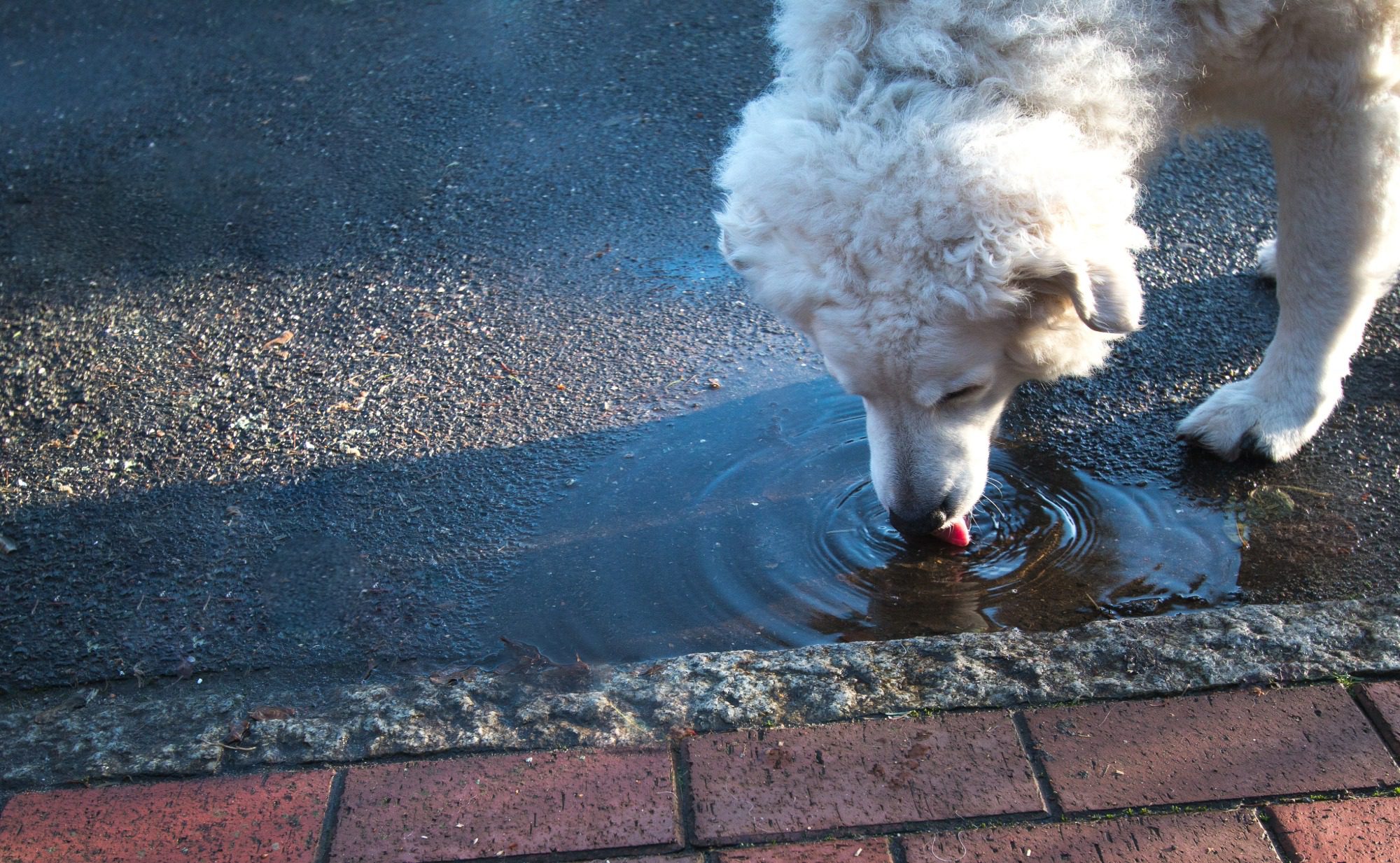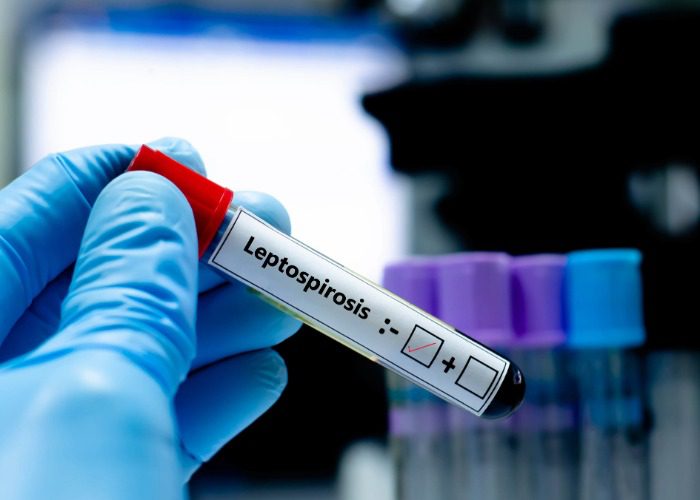Leptospirosis in Dogs: Symptoms, Risks & Prevention Tips
July 6th was World Zoonosis Day. A zoonosis is a disease which is transferrable from animals to humans. As you can imagine, this includes a vast number of diseases. One in particular that we do see in Iowa is Leptospirosis. Fortunately, it is rather rare for humans to contract Leptospirosis.

What is Leptospirosis?
Leptospirosis Interrogans is a specific species of Leptospirosis that causes the most concern in the veterinary community. Leptospirosis is a particular bacteria called a Spirochete. This bacteria has many different subgroups called Serovars. Leptospirosis lives in warm waters. This makes wet summers, especially with flooding the worst for Lepto cases. July through November are peak months for exposure to Lepto. Leptospirosis organisms can live for many months in the infected soil.
As you can imagine, as we enjoy summer water sports or just walks by the lakes and streams, our 4 legged friends may be exposed to deadly Leptospirosis organisms. In Iowa, we have seen the movement of wildlife into more urban or suburban areas and with them, they bring Leptospirosis. Humans have been exposed when walking in flood water. Humans also can be exposed to Leptospirosis through exposure to dog or cat urine if the patient is shedding the bacteria in the urine. Cats are very resistant to Leptospirosis disease but can spread the organism.
Symptoms of Leptospirosis
Leptospirosis organisms enter the bloodstream through cuts in the skin and through the mucus membranes such as eyes and oral cavity. Once established in the body, they invade the blood vessels and spread to the brain, liver, kidney, spleen, eyes and genitalia. Liver and Kidney’s appear to be the most affected. Symptoms develop 5 – 7 days after exposure to this pathogen ( disease causing organism). Some patients may test negative for several days.
Kidney disease – acute renal injury. As opposed to chronic renal disease, this leads to sudden vomiting, inappetence, blood in vomitus or stool. Increased urination or decreased urination, dehydration.
Liver disease – This organism leads to acute liver injury causing sudden vomiting, inappetence, jaundice, diarrhea. This can also lead to bruising or bleeding.
Lung disease – Very rarely, Leptospirosis can lead to a sudden lung hemorrhage, manifested by trouble breathing and coughing blood.
Rare symptoms – Other issues such as inflammation of the eye can occur which can lead to retinal detachment. Patients may also manifest myositis ( painful muscles)or arthritis ( painful joints) leading to lameness and pain.
How do I know if my dog has Leptospirosis?
Leptospirosis should be considered with any patient that has acute kidney injury or jaundice and hepatopathy. Often kidney and liver injury occur at the same time. Usually, these patients have elevated white blood cell counts and abnormal bloodwork. Urinalysis should also be performed.

Serum samples can be sent to an outside laboratory to see if the patient has mounted an immune response to Leptospirosis. Unfortunately, we often cannot positively identify a Lepto case until we compare the initial sample with one that is taken 2 weeks later. Also recently vaccinated patients will have some titer. Therefore, this is an important test but must be interpreted carefully.
PCR test can be done to detect the Lepto bacteria in the urine. This must be done prior to antibiotic use and is also sent to an outside lab.
Witness Lepto test can be ran here at Somerset Veterinary Hospital. This also test for the patient’s immune response. It is a very good test but may miss some positive cases if ran soon after exposure.
Can my dog survive Leptospirosis?
Prognosis is guarded for patients infected with Leptospirosis but with appropriate treatment survival rates are 80 – 90%.
Often patients need intensive treatment including hospitalization, IVF, IV antibiotics and long courses of oral antibiotics. The Kidneys and Liver can recover from insult but often there can be longterm aftereffects. Recovery from Lepto infection does not confer lifelong immunity and treatment can be very expensive.
How can I prevent Leptospirosis?
Thankfully, we have safe and effective Leptospirosis vaccinations for dogs. This series requires a set of two vaccines initially. These vaccines should be 3 – 4 weeks apart. Years ago, quite a few dogs would get painful reactions at the injection site. However, this is less common with modern vaccinations. Leptospirosis vaccination had been reserved for hunting or active outdoor dogs, however, we found many cases of small breed, mainly indoor dogs which suffered from this disease. Therefore, the current recommendation is 2 doses starting at 12 weeks for all puppies. The vaccine may be started at 9 weeks if your puppy is in an endemic environment for Leptospirosis such as flood region, creek bed, farm pond, etc. This initial series is followed with a yearly booster.
The vaccination cannot cover every possible serovar but the most common ones for North America are included.
Can I get Leptospirosis from my dog?
If your dog has been diagnosed with Leptospirosis, he/ she is shedding the bacteria in the urine. This urine can be infectious and should be cleaned carefully. Do not touch the urine without gloves. Be especially careful with an open wound on your skin. It is very rare for humans to contract Leptospirosis from their dogs.
People can also get Leptospirosis from the environment in a similar fashion as dogs. Avoid flood waters. Avoid standing water which is in an area with wildlife present.
At Somerset, we strive to keep our pet owners informed about their pet’s healthcare. I hope you will feel more confident in making decisions about your pet.
If you have any questions, don’t hesitate to ask your primary care provider. If your patient is showing symptoms of Leptospirosis, call (515) 292-0400 for an Urgent Care appointment to be seen the same day.
About Us
We are a woman-owned practice committed to making you and your pet feel at home in our Ames, IA animal hospital. We deliver a full range of services to nurture their health and give them as many years as possible with you. Our services range from life stage wellness care and prevention to surgery, dentistry, and internal medicine, with the goal of meeting all your companion’s needs for life.
